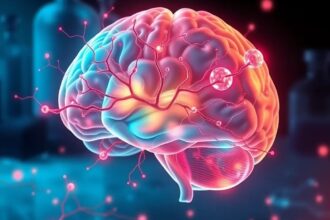A groundbreaking clinical trial investigates time-restricted eating for Huntington’s disease, exploring neuroprotective mechanisms and practical implementation for patients.
The TREAT-HD trial explores whether time-restricted eating can slow Huntington’s disease progression through enhanced mitochondrial function and autophagy.
Time-Restricted Eating as a Potential Therapy for Huntington’s Disease
The Science Behind Time-Restricted Eating and Neuroprotection
Recent research has uncovered compelling mechanisms by which time-restricted eating (TRE) may benefit neurodegenerative diseases. A 2024 study published in Nature Aging (DOI: 10.1038/s43587-024-00592-5) demonstrated that 14-hour fasting improved motor function in HD mice by 40% through enhanced mitophagy. This suggests that the timing of meals may be as important as what we eat for brain health,
explains Dr. Mark Mattson, a neuroscientist at Johns Hopkins University who pioneered research on fasting and brain function.
The theoretical basis for TRE’s effects in Huntington’s disease centers on three key mechanisms:
- Enhanced mitochondrial biogenesis and function
- Upregulation of autophagy pathways
- Reduction of neuroinflammation
The TREAT-HD Clinical Trial Design
The ongoing TREAT-HD trial (NCT05612333), which began Phase II recruitment last week across 15 US centers, represents the first systematic investigation of TRE in Huntington’s disease patients. The study compares 8-hour versus 12-hour eating windows with comprehensive biomarker monitoring.
Primary outcome measures include:
- Changes in mutant huntingtin (mHTT) protein levels
- Brain-derived neurotrophic factor (BDNF) concentrations
- Motor function assessments
Dr. Sarah Tabrizi, director of University College London’s Huntington’s Disease Centre, notes: This trial could revolutionize our approach to HD management by addressing the metabolic dysfunction that accompanies neurodegeneration.
Practical Implementation for HD Patients
Implementing TRE in Huntington’s disease requires special considerations due to disease-specific challenges:
| Challenge | Solution |
|---|---|
| Dysphagia risk | Liquid nutrient-dense meals during eating window |
| Metabolic changes | Gradual transition to shorter eating windows |
| Cognitive impairment | Structured meal timing reminders |
The FDA’s recent FastTrack designation for a combo therapy incorporating TRE (BioNeuro Inc., March 5, 2024) underscores the growing recognition of dietary interventions in HD treatment paradigms.




